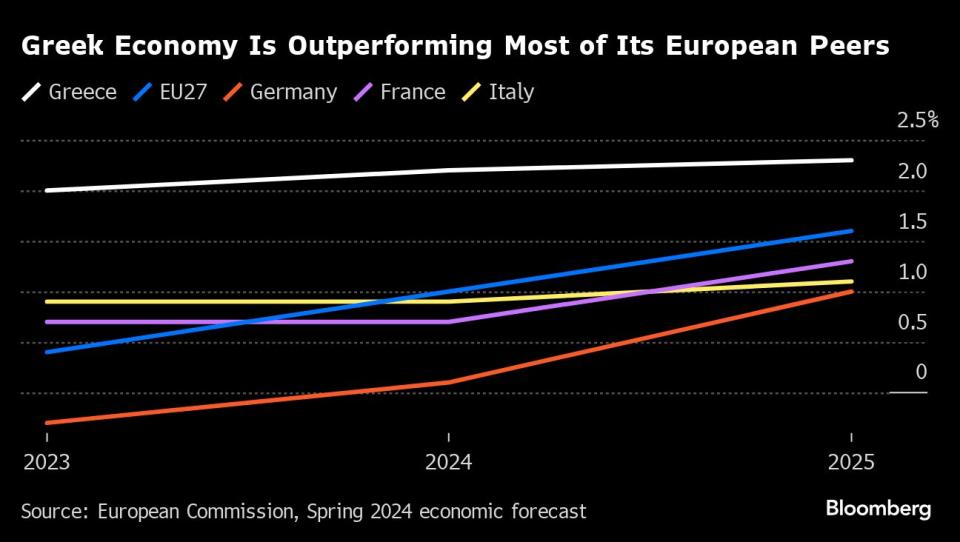Greek PM Says Center Holding in EU Despite Far Right Gains
(Bloomberg) -- Greece’s Prime Minister Kyriakos Mitsotakis said the political center held in the European Parliament elections and created momentum for change, dismissing concerns about an upswell of populism.
Most Read from Bloomberg
Hunter Biden Was Convicted. His Dad’s Reaction Was Remarkable.
Apple to ‘Pay’ OpenAI for ChatGPT Through Distribution, Not Cash
US Inflation Broadly Cools in Encouraging Sign for Fed Officials
Fed Officials Dial Back Rate Forecasts, Signal Just One ‘24 Cut
Stock Bull Run Breaks Record on Fed Decision Day: Markets Wrap
The center-right European People’s Party secured a “blocking minority” and the coalition with other centrist groups remains intact, Mitsotakis said in a Bloomberg TV interview with Tom Mackenzie on Wednesday. He described the success of far-right parties mainly isolated to France and Germany, adding that the political shifts and southern Europe’s economic revival open opportunities for new alliances in the bloc.
“I think there is maybe some degree of over-exaggeration about this right-wing shift,” the Greek prime minister said. “I would argue that the European center held, maybe stronger than many people expected.”
French President Emmanuel Macron and German Chancellor Olaf Scholz’s ruling coalition were handily beaten by populist parties in Sunday’s vote, prompting Macron to call snap legislative elections in France. Mitsotakis declined to comment specifically on the French vote.
With Europe’s traditional heavyweights in turmoil, the Greek premier has emerged as a critical power player in the EU. Despite falling short of the target he’d set for Sunday’s European parliament elections, his New Democracy party won the highest share of votes, giving him a solid hold on power. The tailwind of a growing economy in turn bolsters the country’s standing.
France and Germany remain “the engines” of Europe and “of course having stability and clarity in those two countries is important,” but the shifting economic and political situation can broaden responsibility, Mitsotakis said in a separate sit-down interview with Bloomberg News.
“Maybe there are also new alliances” within the bloc to push issues such as climate adaptation and defense, he said. “The fact that the southern countries have done better, I think it’s encouraging.”
“If you can come up with good ideas at the European level, you can be a policy leader,” he added. “Not everything that we pitch at the European level is going to get traction. But I think there is room for a medium-sized country such as Greece to punch above its weight.”
Even though the Greek government lowered its growth target for 2024 to 2.5% from a previous estimate of 2.9%, the country is performing well above the average growth forecasts in the bloc. While debt as a percentage of economic output still remains one of the highest in Europe, it’s expected to further decline to 152.7% of gross domestic product in 2024 from the high of 207% in 2020.
“Our economy has been significantly overperforming the rest of the euro zone, our debt is on a downward track,” Mitsotakis told Bloomberg TV. “This coming from a country that has been for a long, long time sort of bete noire of the euro zone signifies significant progress.”
Mitsotakis will be one of the key negotiators for top jobs in the bloc. The discussions over the EU’s future leadership comes at a critical time. Gains by populist parties threaten a range of initiatives from joint defense efforts to climate protection.
“The important decisions will continue to be made by the three political families” of the EPP, the socialists and the liberals, Mitsotakis said. “I do think that there is a momentum to drive through important changes in Europe for the next five years.”
Along with the Polish Prime Minister Donald Tusk, Mitsotakis has strongly supported Ursula von der Leyen’s candidacy for a second term as European Commission president. He will now have a few days to convince other leaders to also support her, a task that will surely involve horse-trading over posts.
The EPP has 186 representatives in the 720-member parliament and will need support from other groups to secure a new term for von der Leyen. To confirm a second term, the 65-year-old German needs the backing of a majority of EU lawmakers and a majority of the 27 heads of state or government.
“I am absolutely convinced that Ursula von der Leyen is going to continue as commission president,” Mitsotakis said. “There’s no plan B,” he said in the print interview, adding that the EPP will not cooperate with right-wing groups to get her elected.
In Greece, Mitsotakis’s party won 28.3% in the European ballot, a drop from 40.6% in last year’s national elections and lower than the 33.1% in the 2019 European vote. Despite the decline, his New Democracy party was clearly ahead of the leftist Syriza party which came second with 14.9%. The participation rate was the lowest ever and far-right parties gained more votes, as elsewhere in Europe.
“I think we failed to make the connection between what is happening in Europe and what is happening in Greece,” he said, citing cost of living, healthcare, and public transportation as day-to-day concerns.
--With assistance from Jacqueline Simmons, Paul Tugwell and Megan Howard.
(Updates with additional comments from print interview from seventh paragraph)
Most Read from Bloomberg Businessweek
The World’s Most Online Male Gymnast Prepares for the Paris Olympics
China’s Economic Powerhouse Is Feeling the Brunt of Its Slowdown
As Banking Moves Online, Branch Design Takes Cues From Starbucks
Food Companies Hope You Won’t Notice Shortages Are Raising Prices
©2024 Bloomberg L.P.

 Yahoo News
Yahoo News 




